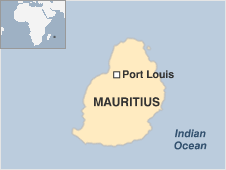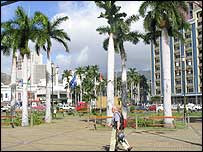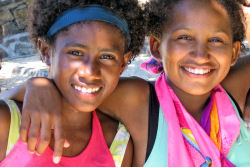 for
stability and racial harmony among
its mixed population of Asians,
Europeans and Africans.
for
stability and racial harmony among
its mixed population of Asians,
Europeans and Africans.The island has maintained one of the developing world's most successful democracies and has enjoyed years of constitutional order.
Overview
It has preserved its image as one of Africa's few social and economic success stories.
|
|
 AT-A-GLANCE
Politics: Navin Ramgoolam
became premier in July 2005,
having already held the post from
1995 to 2000. Changing coalitions
are a feature of politics
Economy: Political stability
and efforts to diversify have
helped Mauritius become one of
Africa's most prosperous
economies.
International: Mauritius
claims the Chagos Islands,
administered by Britain and home
to a US military base on Diego
Garcia.
|
Once reliant on sugar as its main crop export, Mauritius was hit by the removal of European trade preferences but has successfully diversified into textiles, upmarket tourism, banking and business outsourcing.
Various cultures and traditions flourish in peace, though Mauritian
Creoles, descendants of African slaves who
make up a third of the population, live in
poverty and complain of discrimination.
Mauritius was uninhabited when the Dutch took possession in 1598. Abandoned in 1710, it was taken over by the French in 1715 and seized by the British in 1810.
It gained independence in 1968 as a constitutional monarchy, with executive power nominally vested in the British monarch. It became a republic in 1992. The island of Rodrigues and other smaller islets also form part of the country.
Mauritius claims sovereignty over the Chagos islands, which lie around 1,000 km to the north-east. The British territory, which was separated from Mauritius in 1965, is home to the US military base on Diego Garcia. The British government oversaw the forced removal of the Chagos islanders to Mauritius to make way for the base.
The country is home to some of the world's rarest plants and animals. But human habitation and the introduction of non-native species have threatened its indigenous flora and fauna.
The dodo - a flightless bird and a national symbol - was hunted into extinction in the 17th century.
AFRICA
|
ASIA-PACIFIC
|
AMERICAS
|
EUROPE
|
MIDDLEEAST |
SOUTHASIA![]()
![]()
![]()
![]()
![]()
![]()
Mauritania
Mauritius
Morocco
Mozambique
Namibia
Niger
Nigeria
Republic-of-congo
Rwanda
Sao-tome-and-principe
Senegal
Seychelles
Sierra-leone
Somalia
South-africa
Sudan
Swaziland
Tanzania
The-gambia
Togo
Tunisia
Uganda
zambia
Zimbabwe
Australia
Brunei
Burma
Cambodia
China
East-timor
Fiji
Indonesia
Japan
Kazakhstan
Kiribati
Kyrgyzstan
Laos
Malaysia
Marshall-islands
Micronesia
Mongolia
Nauru
New-zealand
North-korea
Palau
Papua-new-guinea
Samoa
Singapore
Solomon-islands
South-korea
Taiwan
Tajikistan
Thailand
The-philippines
Tonga
Turkmenistan
Tuvalu
Uzbekistan
Vanuatu
Vietnam
Antigua-and-barbuda
Argentina
Bahamas
Barbados
Belize
Bolivia
Brazil
Canada
Chile
Colombia
Costa-rica
Cuba
Dominica
Dominican-republic
Ecuador
El-salvador
Grenada
Guatemala
GuyanaHaiti
Honduras
Jamaica
Mexico
Nicaragua
Panama
Paraguay
Peru
St-kitts-and-nevis
St-lucia
St-vincent-and-the-grenadines
Suriname
Trinidad-and-tobago
United-states-of-america
Uruguay
Venezuela
Albania
Andorra
Armenia
Austria
Azerbaijan
Belarus
Belgium
Bosnia-hercegovina
Bulgaria
Croatia
Cyprus
Czech-republic
Denmark
Estonia
Finland
France
Georgia
Germany
Greece
Hungary
Iceland
Ireland
Italy
Latvia
Liechtenstein
Lithuania
Luxembourg
Macedonia
Malta
Moldova
Monaco
Montenegro
Norway
Poland
Portugal
Russia
San-marino
Serbia
Slovakia
Slovenia
Spain
Sweden
Switzerland
The-netherlands
Turkey
Ukraine
United-kingdom
Vatican
Algeria
Egypt
Iran
Iraq
Israel-and-palestinian-territories
Jordan
Kuwait
Lebanon
Libya
Mauritania
Oman
Saudi-arabia
Sudan
Syria
Tunisia
United-arab-emirates
Yemen
Afghanistan
Bangladesh
Bhutan
India
Nepal
Pakistan
Sri-Lanka
The-Maldives


